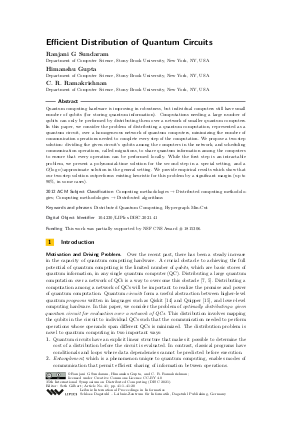Efficient Distribution of Quantum Circuits
Authors Ranjani G Sundaram, Himanshu Gupta, C. R. Ramakrishnan
-
Part of:
Volume:
35th International Symposium on Distributed Computing (DISC 2021)
Part of: Series: Leibniz International Proceedings in Informatics (LIPIcs)
Part of: Conference: International Symposium on Distributed Computing (DISC) - License:
 Creative Commons Attribution 4.0 International license
Creative Commons Attribution 4.0 International license
- Publication Date: 2021-10-04
File

PDF
LIPIcs.DISC.2021.41.pdf
- Filesize: 1.82 MB
- 20 pages
Document Identifiers
Subject Classification
ACM Subject Classification
- Computing methodologies → Distributed computing methodologies
- Computing methodologies → Distributed algorithms
Keywords
- Distributed Quantum Computing
- Hypergraph Min-Cut
Metrics
- Access Statistics
-
Total Accesses (updated on a weekly basis)
0Document
0Metadata
Abstract
Quantum computing hardware is improving in robustness, but individual computers still have small number of qubits (for storing quantum information). Computations needing a large number of qubits can only be performed by distributing them over a network of smaller quantum computers. In this paper, we consider the problem of distributing a quantum computation, represented as a quantum circuit, over a homogeneous network of quantum computers, minimizing the number of communication operations needed to complete every step of the computation. We propose a two-step solution: dividing the given circuit’s qubits among the computers in the network, and scheduling communication operations, called migrations, to share quantum information among the computers to ensure that every operation can be performed locally. While the first step is an intractable problem, we present a polynomial-time solution for the second step in a special setting, and a O(log n)-approximate solution in the general setting. We provide empirical results which show that our two-step solution outperforms existing heuristic for this problem by a significant margin (up to 90%, in some cases).
Cite As Get BibTex
Ranjani G Sundaram, Himanshu Gupta, and C. R. Ramakrishnan. Efficient Distribution of Quantum Circuits. In 35th International Symposium on Distributed Computing (DISC 2021). Leibniz International Proceedings in Informatics (LIPIcs), Volume 209, pp. 41:1-41:20, Schloss Dagstuhl – Leibniz-Zentrum für Informatik (2021)
https://doi.org/10.4230/LIPIcs.DISC.2021.41
BibTex
@InProceedings{gsundaram_et_al:LIPIcs.DISC.2021.41,
author = {G Sundaram, Ranjani and Gupta, Himanshu and Ramakrishnan, C. R.},
title = {{Efficient Distribution of Quantum Circuits}},
booktitle = {35th International Symposium on Distributed Computing (DISC 2021)},
pages = {41:1--41:20},
series = {Leibniz International Proceedings in Informatics (LIPIcs)},
ISBN = {978-3-95977-210-5},
ISSN = {1868-8969},
year = {2021},
volume = {209},
editor = {Gilbert, Seth},
publisher = {Schloss Dagstuhl -- Leibniz-Zentrum f{\"u}r Informatik},
address = {Dagstuhl, Germany},
URL = {https://drops.dagstuhl.de/entities/document/10.4230/LIPIcs.DISC.2021.41},
URN = {urn:nbn:de:0030-drops-148434},
doi = {10.4230/LIPIcs.DISC.2021.41},
annote = {Keywords: Distributed Quantum Computing, Hypergraph Min-Cut}
}
Author Details
Funding
This work was partially supported by NSF CNS Award # 1815306.
References
-
Yaroslav Akhremtsev, Tobias Heuer, Peter Sanders, and Sebastian Schlag. Engineering a direct k-way hypergraph partitioning algorithm. In 2017 Proceedings of the Ninteenth Workshop on Algorithm Engineering and Experiments (ALENEX). SIAM, 2017.

-
Konstantin Andreev and Harald Racke. Balanced graph partitioning. Theory of Computing Systems, 39(6), 2006.

-
P. Andres-Martinez and C. Heunen. Automated distribution of quantum circuits via hypergraph partitioning. Phys. Rev. A, 100(3), 2019.

-
C. H. Bennett, G. Brassard, C. Crépeau, R. Jozsa, A. Peres, and W. K. Wootters. Teleporting an unknown quantum state via dual classical and Einstein–Podolsky–Rosen channels. Phys. Rev. Lett., 70(13), 1993.

-
M. Caleffi, A. S. Cacciapuoti, and G. Bianchi. Quantum internet: from communication to distributed computing!, 2018.

-
Moses Charikar. Greedy approximation algorithms for finding dense components in a graph. In International Workshop on Approximation Algorithms for Combinatorial Optimization. Springer, 2000.

-
J. I. Cirac, A. K. Ekert, S. F. Huelga, and C. Macchiavello. Distributed quantum computation over noisy channels, phys. rev. a. Phys. Rev. A, 59(4249), 1999.

-
O. Daei, K. Navi, and M. Zomorodi-Moghadam. Optimized quantum circuit partitioning. Int. J. Theor. Phys., 59(12):3804-3820, 2020.

- D. Dieks. Communication by EPR devices. Physics Letters A, 92(6), 1982. URL: https://doi.org/10.1016/0375-9601(82)90084-6.
- L.-M. Duan, M. D. Lukin, J. I. Cirac, and P. Zoller. Long-distance quantum communication with atomic ensembles and linear optics. Nature, 414(6862), November 2001. URL: https://doi.org/10.1038/35106500.
-
J. Eisert, K. Jacobs, P. Papadopoulos, and M.B. Plenio. Optimal local implementation of non-local quantum gates. Phys. Rev. A, 62(052317-1), 2000.

-
B. Kernighan and S. Lin. An efficient heuristic procedure for partitioning graphs. Bell Syst. Tech. J., 49(2), 1970.

- Michael A. Nielsen and Isaac L. Chuang. Quantum Computation and Quantum Information: 10th Anniversary Edition. Cambridge University Press, 2010. URL: https://doi.org/10.1017/CBO9780511976667.
- Qiskit. URL: https://qiskit.org/.
- Quipper. URL: https://www.mathstat.dal.ca/~selinger/quipper/doc.
-
Nicolas Sangouard, Christoph Simon, Hugues De Riedmatten, and Nicolas Gisin. Quantum repeaters based on atomic ensembles and linear optics. Reviews of Modern Physics, 2011.

- W. K. Wootters and W. H. Zurek. A single quantum cannot be cloned. Nature, 299(5886), 1982. URL: https://doi.org/10.1038/299802a0.
-
A. Yimsiriwattana and S. J. Lomonaco Jr. Distributed quantum computing: A distributed Shor algorithm. Quantum Information and Computation II, 5436, 2004.

-
A. Yimsiriwattana and S. J. Lomonaco Jr. Generalized GHZ states and distributed quantum computing. AMS Cont. Math., 381(131), 2005.

